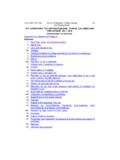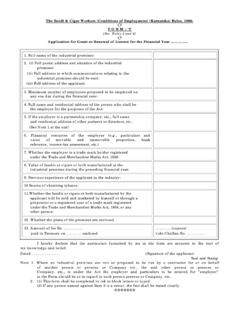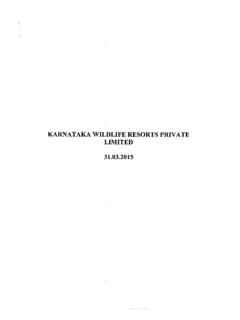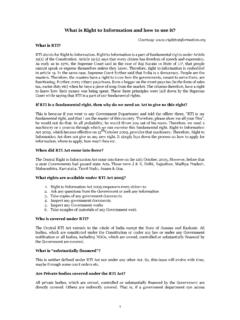Transcription of SEZ Instruction No.9/2011 Office of the …
1 SEZ Instruction Office of the Development Commissioner Special Economic Zones Karnataka and Kerala Administrative Office , CSEZ, Kakkanad, Kochi, Kerala 682 037 1st June 2011 To All SEZ Developers All SEZ Units All Specified/Authorised Officers All Assistant Development Commissioners Subject: Role of specified/authorized officers Regarding. Since the coming into force of the Special Economic Zones Act, 2005 along with the Special Economic Zones Rules, 2006 on 10th February 2006, the number of Zones notified under the Act has grown tremendously in Karnataka and Kerala and they continue to increase. Each of these Zones has its own administrative-regulatory establishment with the Development Commissioner, Cochin Special Economic Zone notified as the Development Commissioner of the Zones, other than any multi-product Special Economic Zone, since separate posts at that level have not been envisaged at this stage.
2 This is in accordance with the statutory intention in section 11 of the Special Economic Zones Act, 2005. The approved personnel for each of these Special Economic Zones created by an order of the Government of India which, inter alia, includes Superintendents of Central Excise/Superintendents of Customs/Appraisers of Customs as well as Inspectors of Central Excise/Preventive Officers /Examiners of Customs. As per section 12, all officers posted in a Special Economic Zone function under the administrative control of the Development Commissioner. 2. The Special Economic Zones Act, 2005 has created only one statutory authority in relation to Special Economic Zones but bearing in mind the specific task of handling of goods in a Special Economic Zone, the Special Economic Zones Rules, 2006 has recognized two other authorities, viz.
3 , Specified Officer and Authorized Officer. These authorities have been defined in Rule 2(zd) and Rule 2(c) of the Special Economic Zones Rules, 2006. As such officers are creations of the said Rules, their power and authority is circumscribed by the content of the Rules and the limit of their actions shall be the specific provisions of the Rules which require them to perform a certain function in a certain context. They shall not exercise any other power or perform any function other those prescribed in the Rules except where such functions have been specifically delegated, in writing, by the Development Commissioner; in so doing, the Development Commissioner shall be guided by section 12 of the Special Economic Zones Act, 2005.
4 3. Specified Officers, in relation to a Special Economic Zone means Joint/Deputy/Assistant Commissioner of Customs for the time being posted in the Special Economic Zones and Authorized Officer means Inspectors/Preventive Officers/ Appraisers/Superintendents of Customs for the time being posted in the Special Economic Zones. Where no Specified Officer is posted in a Special Economic Zone, Development Commissioner, under Rule 73 of the Special Economic Zones Rules, 2006, nominate a gazetted officer of Customs to discharge the functions of the Specified Officer under the Special Economic Zones Rules, 2006. Though these officers are drawn from the formations of and under the Central Board of Excise & Customs, it needs to be understood that this is a source of recruitment for the posts created in a Special Economic Zone; it neither confers on them the powers and functions of proper officer or corresponding offices created under or operating under the Customs Act, 1962 nor makes them accountable to any authority created by the Customs Act, 1962 during the time that they are posted in the Special Economic Zone.
5 The manner of their posting and conditions of service is elaborated in the SEZ Instructions 8/2011 dated 1st June 2011. 4. In view of the technical background of the Authorized and Specified Officers posted in a Special Economic Zone and the historical functioning of officers occupying similar posts in the seven Special Economic Zones of the Government of India that have existed for decades preceding the enactment of the Special Economic Zones Act, 2005, the context of the Special Economic Zones needs amplification to set at rest all doubts about the responsibilities under the existing statute. The existing Export Processing Zones were converted in 2001 in the Foreign Trade Policy which substituted the Export Processing Zones scheme with the Special Economic Zones scheme and the salient difference between the two schemes was the removal of the restriction that only manufacturing entities could exist in such Zones and the introduction of the concept of deemed foreign territory for the purpose of tariff laws of the country.
6 Though the Foreign Trade Policy was amended in 2001, only the re-designation of the existing Export Processing Zones took place then with the implementation of deemed foreign territory took place only in May 2004 with the coming into force of section 76A of the Customs Act, 1962 which recognized that removals to a Special Economic Zone was tantamount to physical export and removals from the Special Economic Zones was tantamount to imports into India. Accordingly, transactions inside a Special Economic Zone was placed outside the pale of the Customs Act, 1962. With the coming into force of the Special Economic Zones Act, 2005 on 10th February 2006 all links to the Foreign Trade Policy and the Customs Act, 1962 were removed except for the limited purpose of valuation of goods when brought into the Special Economic Zone from outside the country or for clearances into the Domestic Tariff Area and for sanction of drawback to units procuring goods from the Domestic Tariff Area.
7 5. The defining transformation that occurred in May 2004 was the delinking of the Central Excise Act, 1944 from operations in Special Economic Zones. Prior to the delinking, the units in the Export Processing Zone were considered as factories coming under the ambit of the Central Excise Act, 1944 with the Zone itself being notified under section 3 of the Central Excise Act, 1944, the exemption of Central Excise duties being available in terms of notification issued under section 5A of the Central Excise Act, 1944 and duties on clearance into the local market being charged to duty under section 3 of the Central Excise Act, 1944. The exemption of duty on goods imported to be used in such units was granted by a separate notification under the Customs Act, 1962 which required the units to be declared as a warehouse under that Act.
8 Warehouses were under the control of bond officers and hence units in Export Processing Zones (which later became Special Economic Zones in 2001) were bonded under section 62 of the Customs Act, 1962 with deemed registration under the Central Excise Act, 1944 till May 2004. Moreover, with the Government of India as the only developer till 2001 when the Foreign Trade Policy incorporated the Special Economic Zone scheme, the need for exempting duty on goods brought into Zones for use by the developer was not felt. Since these Export Processing Zones (and Special Economic Zones) were operated as industrial parks by the Government of India, the functions of bond officers was discharged by officers of Customs on the rolls of the said Export Processing Zones as Deputy Commissioner of Customs, Superintendent/Appraisers of Customs and Inspectors/Preventive Officers drawn on deputation from Central Board of Customs and under the administrative control of the Development Commissioner but exercising powers under the Customs Act, 1962 in discharge of which the supervisions vested with the local Commissioner of Customs.
9 6. With the operationalizing of Chapter XA of the Customs Act, 1962, the applicability of warehousing provisions was done away with but the physical control over the operations continued with the specific roles and responsibilities assigned to officers of Customs posted in the Special Economic Zones under the Customs Act, 1962 including the responsibility to supervise the utilization of goods imported or procured free of duty. With effect from 10th February 2006, when Chapter XA of the Customs Act, 1962 was superceded, the power, functions and responsibilities under the Customs Act, 1962 of the Customs officers posted in Special Economic Zones ceased to exist and such officers exercise their role as Specified Officers and Authorised Officers as creations of the Special Economic Zones Act, 2005.
10 In the absence of requirements of physical bonding under the Special Economic Zones Rules, 2006, physical control over the units or the boundaries of the Special Economic Zones has become redundant. The historically assigned functions of control over the gate is now superfluous and it is for the Development Commissioner, with adequate safeguards, through control over the security establishment of the Developer at the mandated boundary enclosure, to ensure that the scope for diversion of non-duty paid goods is eliminated. For this purpose, the Development Commissioner may require the Developer to enforce such systems as deemed fit and may also delegate functions to the one or more officers posted in the Special Economic Zones and such officers shall be empowered thereon to act on that delegation.





